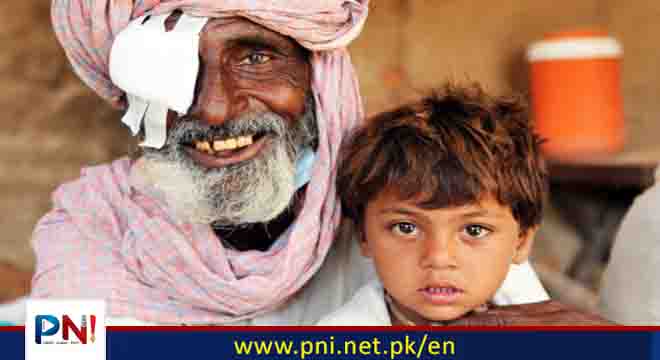October 11, The theme for this year’s World Sight Day, “Universal Eye Health,” underscores the urgent need to address the eye health disparities existing in our society. In Pakistan, millions of people continue to face significant challenges in accessing adequate eye care, resulting in unnecessary vision loss and impaired quality of life.
This World Sight Day (12 October), international development organisation Sightsavers is calling on global leaders to end the geographical inequity of eye health services.
Everyone, including remote and rural communities, women and girls, people with disabilities, should have access to the services they need. Yet the availability of eye health services and products like glasses varies across and within countries. They are often easily accessible in urban areas but less so in other places and for marginalised groups.
Globally, 1.1 billion people have an untreated or preventable visual impairment. In Pakistan there were an estimated 11.60% people with vision loss in 2020.
Women account for more than half of blindness and visual impairment across the world. Compared to people without disabilities, people with disabilities are also three times less likely to get the healthcare they need4.
Munazza Gillani, Country Director at Sightsavers comments: “Eye health should be equally available to everyone, no one should be disadvantaged because of where they live, their gender, health, or background. But currently it is inaccessible for some sectors of society and even a luxury for those in urban areas.
“This needs to change. When we tackle these issues, children can learn and adults can earn. Eye health equals a ripple effect on the lives of individuals, families, and communities, helping nations to thrive and reducing poverty and inequality.”
Governments are working towards achieving the Sustainable Development Goals (SDGs), a set of United Nations (UN) goals which aim to reduce global poverty and inequality and protect the planet. They include a target to achieve universal health coverage (UHC), ensuring everyone has access to health services. In 2021, global leaders also unanimously adopted the UN ‘Vision for Everyone’ resolution, which explicitly links eye health to all the SDGs.
To achieve the goals and resolution, inclusive eye health is essential. Unless it is recognised as a vital part of healthcare and development, efforts to achieve the SDGs and UHC will fail. Indeed, the World Health Organization reported in September that “the world is off track to make significant progress towards universal health coverage” and that improvements to health services coverage have stagnated5.
The impact of inclusive eye health can be seen through stories such as Rukhsana from Jahanian District Khanewal. She is hard of hearing and speech impairment. She visited the Optometry clinic and got eye screening and refraction test done.
Sightsavers alongwith its partners is also marking World Sight Day by arranging free eye screening camp at special education school in Sheikhupura, Punjab and also holding awareness raising walks in connection with World Sight Day.
Munazza Gillani continues: “We are already working with the government and other partners to improve eye health services and we commend their efforts. But more needs to be done to ensure eye health is represented in health planning, resourcing, and funding. Including people with disabilities, women, and other marginalised groups, community outreach, and a geographically spread workforce, will help reduce disparity of access.”
Sightsavers firmly believes that equitable eye care services are a fundamental human right. We call upon the government, healthcare professionals, and other relevant stakeholders to prioritize and invest in initiatives that can contribute towards universal access to quality eye care services throughout Pakistan.
Follow the PNI Facebook page for the latest news and updates.









